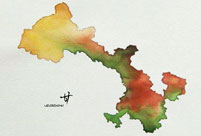On the eve of the three-day long Workers' Day holiday, IT engineer Feng Yue from south China's Hainan Province is planning a trip to southwestern province of Yunnan with his girlfriend.
While his parents consult local travel agencies for a group tour, Feng, 26, gets all the itinerary, tickets and accommodation ready beforehand on his smartphone.
"It's convenient and cost effective. Comments online should be more reliable than a salesman's pitch," Feng said.
Rising affluence, a better transportation network and pent-up curiosity means more Chinese are hitting the road and trip no longer means an all-inclusive package tour sold by bricks-and-mortar travel agencies. Travel websites are flourishing with individual customers like Feng who prefer freedom in making their planning while seeking quality service at the best available price.
GROWING PIE
Last year, online travel transactions hit 200 billion yuan (31.96 billion U.S. dollars), up 27.7 percent year on year, according to iResearch, a research and consulting group. But it only accounts for about 7.7 percent of the total travel market.
"The online travel market is growing faster and will be bigger than other countries. We have good local government support and the potential is enormous," said Henrik Kjellberg, chairman of eLong, a Nasdaq-listed company providing online hotel reservations in China.
The rising independent tourism community who demand better service has driven the online gains. The tropical coastal city of Sanya in Hainan Province received over 700,000 tourists during the week-long Spring Festival holiday last year, with individual tourists accounting for about two thirds of total, according to local tourism bureau.
The State Council, China's cabinet, decided to develop the tourism sector into a strategic pillar industry supporting economic growth in 2009.This year is the National Tourism Administration's (NTA's) "Year of Smart Tourism". A national smart tourism service center in Zhenjiang and 33 pilot smart tourism cities nationwide are doing everything in their power to improve the individual travel experience.
Smart tourism is a key step to upgrading the tourism sector from traditional service industry to a modern one, said Shao Qiwei, director of the NTA.
 |
 The Western Qing Mausoleum
The Western Qing Mausoleum Overseas returnees strive for dreams in Beijing
Overseas returnees strive for dreams in Beijing Fried up: Chili pork bonanza in Central China
Fried up: Chili pork bonanza in Central China Hand-painted maps go viral online
Hand-painted maps go viral online 4th Beijing Int'l Film Festival ends
4th Beijing Int'l Film Festival ends Commando elite specializes in sign language
Commando elite specializes in sign language Man photoshops himself into girlfriend's childhood photos
Man photoshops himself into girlfriend's childhood photos Photo story: Stallholders at Beijing Zoo Wholesale Market
Photo story: Stallholders at Beijing Zoo Wholesale Market Artists on backstage
Artists on backstage 'African Street' in Guangzhou
'African Street' in Guangzhou Special operation members in comprehensive training
Special operation members in comprehensive training Cute Shaolin boy melts the hearts of millions
Cute Shaolin boy melts the hearts of millions Giant panda Sijia is back to happy life
Giant panda Sijia is back to happy life Richest Chinese of 2014: half from the mainland
Richest Chinese of 2014: half from the mainland Chengdu - laid-back lifestyle makes happiest city
Chengdu - laid-back lifestyle makes happiest cityDay|Week|Month